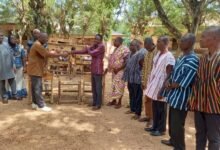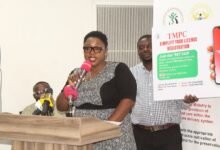
The National sexually Transmitted Infections (STIs) and HIV/AIDs Control Programme (NACP) has implored the general public to take seriously testing to know their HIV status in the wake of increased infections across the country.
The Monitoring and Evaluation Officer at the Programme, Kenneth AyehDanso, describing the country’s HIV prevalence as a “generalised epidemic” said testing was the only way out to put those reactive to the virus on early treatment and for person’s negative to take precautionary measures against infection.
He was speaking at a media training workshop organised by the Ghana HIV and AIDs Network (GHANET) to rethink current HIV programming and interventions in the face of dwindling donor support amidst rise in HIV infections.
It was on the theme; “Rethinking HIV interventions for Vulnerable Populations in the country”.
Mr Danso said per a 2021 HIV/AIDS estimate of about 345,599 persons living with HIV (PLHIVs) in Ghana, 22.7 percent (78,450) were among men who had sex with men (MSM; 18.1 per cent) and female sex workers (FSW; 4.6 per cent).
“We know that most men have poor health seeking behaviours unlike women who visit at the least symptom they experience, and the danger is that these men are often bisexual so they are likely to have different partners they have sex with and they too may have sex with another, then the disease is transmitting.”
He said testing to know one’s HIV status would set the country on the path to achieving the UNAIDs 95-95-95 target of having 95 percent of PLHIVs knowing their status, 95 percent on anti-retroviral treatment and 95 percent attaining viral suppression by 2025.
“Currently, we have achieved 71-99-79 of this target, which means there is a huge gap at people knowing their HIV status and people sticking religiously to their medications to achieve viral suppression.”
A Public Health Consultant, DrNiiNorteyHanson-Nortey, urged government to keep HIV prevention and treatment as a front-burner issue on its political agenda.
He called on the government to, as a matter of urgency, invest in the legal and social infrastructures that militate the HIV/AIDS fight.
“Investing in an effective and efficient response system for sexual, domestic and gender-based violence, intimate sexual partner violence, among others, we ensure a stigma and violence free environment.”
Dr Hanson-Nortey stressed the need to reduce stigma surrounding HIV testing as well as make HIV testing centres and kits readily available, especially to key populations and vulnerable groups such as young people, FSWs and MSMs.
The President of GHANET, Mr Ernest Ortsin, urged the public to be wary of unorthodox medications purporting to cure HIV/AIDs, saying, “There is no evidence to suggest that any herbal medicine can cure HIV”.
“Even the anti-retroviral medication do not cure HIV/AIDs, they only suppress the viral load so there is no cure as at now for the disease. People should be bold to report when they get to know their HIV status for the right treatment to lead normal lives,” he advised.
Recent data from the NACP indicated that a total of 23,495 tested positive for HIV in Ghana for the first half of this year.
The figure is two percent of the 948,094 people who undertook HIV testing from January to June 2022.
Currently, Ghana has a 1.7 percent HIV prevalence, which means that of every 100 people tested in the country, two are positive for the disease.
At the end of 2021, 16,938 new HIV infections were recorded in the country, with 9,859 persons dying from the disease.
BY ABIGAIL ANNOH








